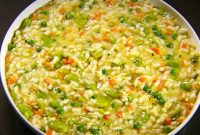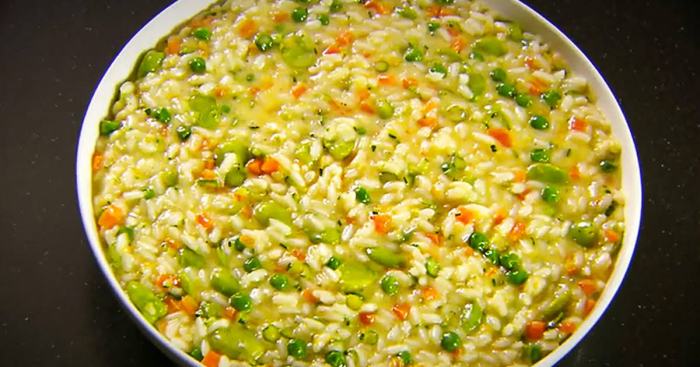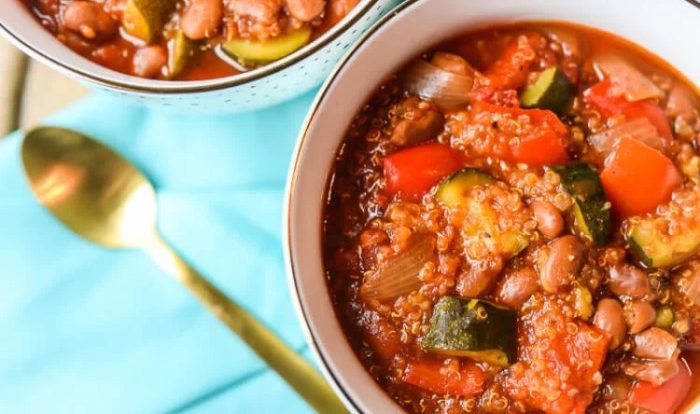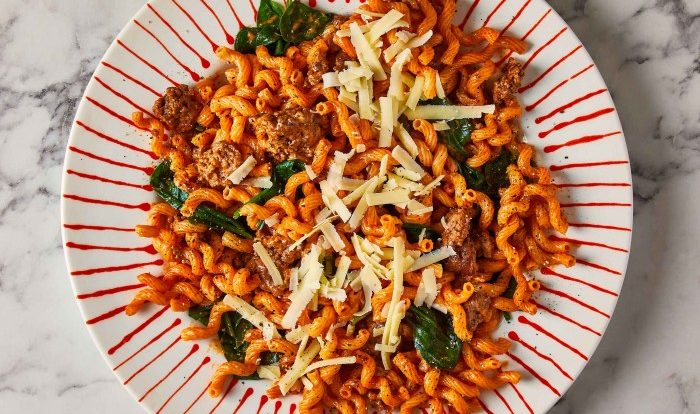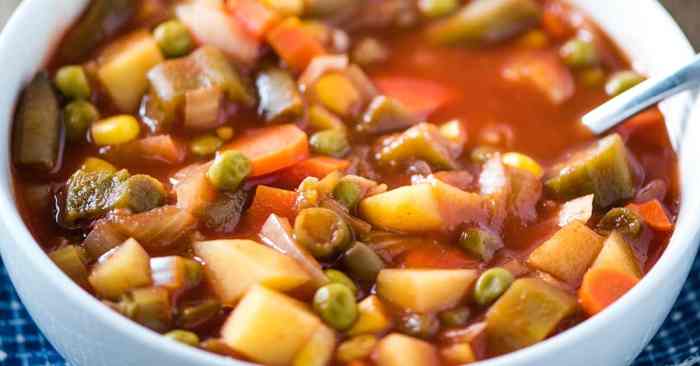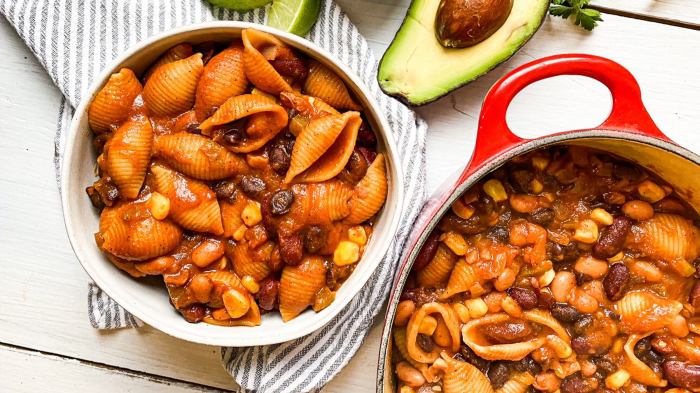Protein in oats 100g is a topic of great importance in the realm of nutrition, offering a unique blend of essential amino acids and health benefits. This comprehensive guide delves into the intricacies of oat protein, exploring its nutritional value, amino acid profile, and the myriad of advantages it offers for a balanced and healthy lifestyle.
Oats, renowned for their versatility and nutritional prowess, stand out as a remarkable source of protein among grains. With a rich amino acid profile that rivals plant-based heavyweights like soy and quinoa, oats provide a complete protein source for vegetarians and vegans alike.
Overview of Protein in Oats
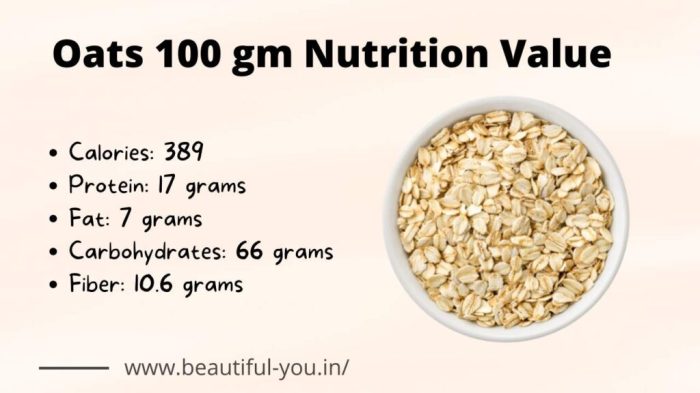
Protein, an essential macronutrient, plays a crucial role in the human body, supporting muscle growth and repair, hormone production, and immune function. Oats, a whole grain cereal, have emerged as a notable source of protein, offering a nutritious alternative to other grains like wheat and rice.
Nutritional Value of Oats
Oats are a rich source of protein, fiber, vitamins, and minerals. A 100-gram serving of oats provides approximately 16 grams of protein, making it a substantial source of plant-based protein. Additionally, oats are low in calories and high in dietary fiber, contributing to satiety and digestive health.
Comparison to Other Grains
Compared to other common grains, oats have a higher protein content. For instance, a 100-gram serving of brown rice provides about 8 grams of protein, while quinoa offers around 14 grams. Oats also contain a unique type of soluble fiber called beta-glucan, which has been linked to improved cholesterol levels and reduced risk of heart disease.
Protein Content in 100g of Oats
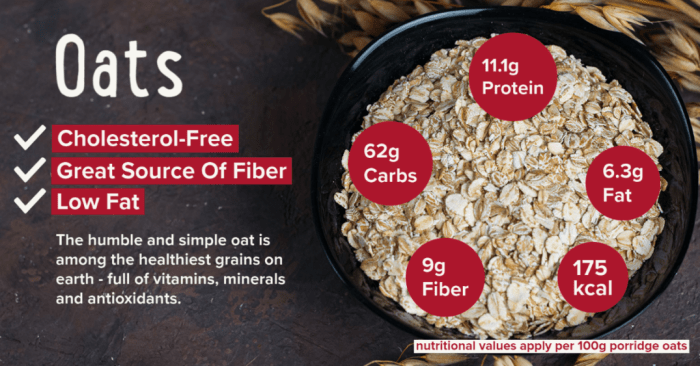
Oats are a popular breakfast cereal known for their nutritional value, including their protein content. Determining the exact amount of protein in 100g of oats is crucial for understanding its contribution to a balanced diet.
According to the USDA FoodData Central database, 100g of dry oats contain approximately 16.9 grams of protein.
Comparison to Other Breakfast Cereals
To provide context, here’s a table comparing the protein content of oats to other popular breakfast cereals:
| Cereal | Protein per 100g (g) |
|---|---|
| Oats | 16.9 |
| Wheat Bran | 12.5 |
| Corn Flakes | 8.5 |
| Rice Krispies | 7.8 |
Factors Influencing Protein Content
The protein content in oats can vary depending on several factors:
- Variety:Different varieties of oats may have slightly different protein levels.
- Growing Conditions:Environmental factors such as soil quality and climate can influence protein content.
- Processing Methods:The way oats are processed, such as rolling or grinding, can also affect protein content.
Amino Acid Profile of Oat Protein
Oat protein boasts a comprehensive amino acid profile, encompassing both essential and non-essential amino acids. Understanding the amino acid composition of oat protein is crucial as it influences its quality and absorption.
Essential amino acids, which the body cannot synthesize on its own, are adequately represented in oat protein. These include lysine, methionine, phenylalanine, threonine, tryptophan, valine, isoleucine, leucine, and histidine. Non-essential amino acids, produced by the body, are also present, such as alanine, arginine, asparagine, aspartate, cysteine, glutamate, glutamine, glycine, proline, serine, and tyrosine.
Comparison to Other Plant-Based Proteins
Compared to other plant-based proteins like soy and quinoa, oat protein exhibits a distinct amino acid profile. While soy protein is generally considered a complete protein, containing all essential amino acids, it has a lower concentration of methionine and cysteine than oat protein.
Quinoa, on the other hand, has a similar amino acid profile to oat protein but is slightly higher in lysine.
Significance of Amino Acid Composition
The amino acid composition of a protein directly impacts its quality and absorption. Essential amino acids are vital for various bodily functions, such as muscle growth, tissue repair, and hormone production. Non-essential amino acids, although not indispensable, still play important roles in metabolism and protein synthesis.
With 100 grams of oats packing a whopping 17 grams of protein, it’s no wonder they’re a breakfast staple. But if you’re craving something decadent, don’t despair! While chocolate fudge cake calories may not be the healthiest choice, a small slice can satisfy your sweet tooth without breaking the bank protein-wise.
So, indulge guilt-free, knowing that your oats have got your protein needs covered.
A balanced amino acid profile, like that found in oat protein, ensures the body has the necessary building blocks for protein synthesis and optimal functioning.
Benefits of Protein in Oats
Consuming protein from oats offers numerous health benefits. This nutritious grain is a rich source of high-quality protein that supports various bodily functions, including muscle growth, satiety, and blood sugar control.
Research studies have demonstrated the positive effects of oat protein on overall well-being. Here are some of the key benefits:
Muscle Growth and Repair
Oat protein is a complete protein, meaning it contains all the essential amino acids necessary for muscle growth and repair. Consuming adequate protein is crucial for maintaining and building muscle mass, which is especially important for athletes, active individuals, and those recovering from injuries.
Satiety, Protein in oats 100g
Protein is known for its satiating effects. Consuming oats, which are high in protein and fiber, can promote feelings of fullness and reduce hunger cues. This can help individuals manage their weight and prevent overeating.
Blood Sugar Control
Oat protein has a low glycemic index, meaning it releases glucose slowly into the bloodstream. This helps prevent spikes in blood sugar levels, which can lead to insulin resistance and other health issues. Consuming oats can improve blood sugar control and reduce the risk of developing type 2 diabetes.
Incorporating Oats into a High-Protein Diet: Protein In Oats 100g
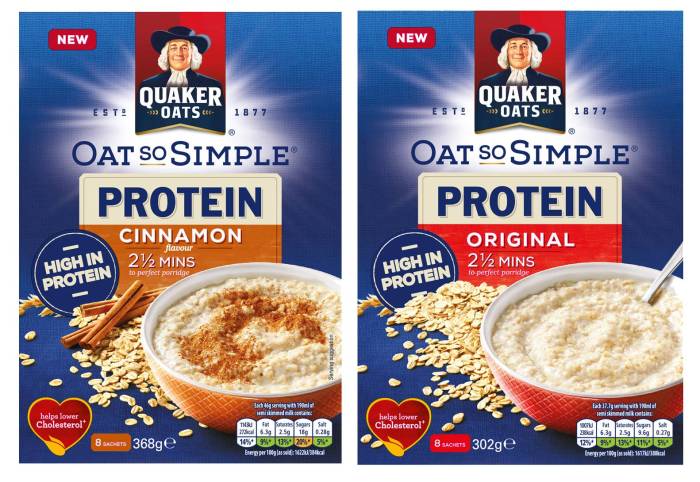
Oats are a versatile and nutritious grain that can easily be incorporated into a high-protein diet. They are a good source of soluble fiber, which can help lower cholesterol levels and promote satiety. Oats also contain a variety of vitamins and minerals, including iron, zinc, and magnesium.
There are many ways to add oats to your diet. One simple way is to add them to your morning oatmeal or smoothie. You can also add oats to baked goods, such as muffins, cookies, and pancakes. Oats can also be used as a breading for chicken or fish, or as a topping for salads or soups.
Sample Meal Plan
Here is a sample meal plan that includes oats as a source of protein throughout the day:
- Breakfast:Oatmeal with berries and nuts (1 cup cooked oats, 1/2 cup berries, 1/4 cup nuts)
- Lunch:Salad with grilled chicken and quinoa (1 cup salad greens, 1/2 cup grilled chicken, 1/2 cup cooked quinoa, 1/4 cup vegetables)
- Dinner:Salmon with roasted vegetables and brown rice (4 ounces salmon, 1 cup roasted vegetables, 1/2 cup brown rice)
- Snack:Greek yogurt with fruit and granola (1 cup Greek yogurt, 1/2 cup fruit, 1/4 cup granola)
This meal plan provides approximately 120 grams of protein per day, which is the recommended amount for adults who are not pregnant or breastfeeding.
Versatility of Oats
Oats are a versatile grain that can be used in a variety of dishes. They are a good source of protein, fiber, and vitamins and minerals. Oats can be cooked in a variety of ways, making them a convenient and easy-to-prepare food.
Oats are also a relatively inexpensive grain, making them a good option for people on a budget.
Oats are suitable for various dietary preferences and restrictions. They are naturally gluten-free, making them a good option for people with celiac disease or gluten intolerance. Oats are also a good source of plant-based protein, making them a good choice for vegetarians and vegans.
Ultimate Conclusion
Incorporating oats into a high-protein diet is a simple and effective way to reap its nutritional benefits. Whether it’s a hearty bowl of oatmeal for breakfast, a protein-packed smoothie, or a savory oat-based dinner, the possibilities are endless. Oats’ versatility extends to accommodating various dietary preferences and restrictions, making it an inclusive choice for all.
As we conclude our exploration of protein in oats 100g, it is evident that this humble grain packs a powerful punch. Its nutritional value, amino acid composition, and health benefits make it an indispensable addition to a balanced and wholesome diet.
